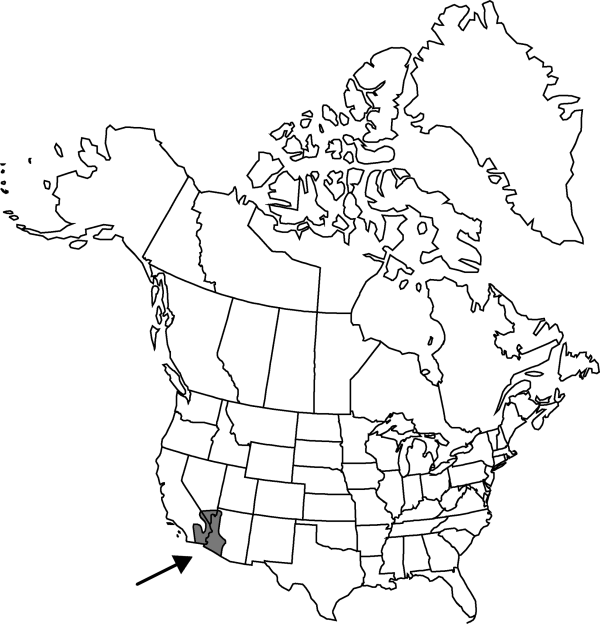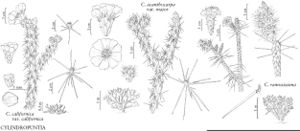FNA>Volume Importer |
imported>Volume Importer |
| (7 intermediate revisions by 2 users not shown) |
| Line 1: |
Line 1: |
| | {{Treatment/ID | | {{Treatment/ID |
| | |accepted_name=Cylindropuntia ramosissima | | |accepted_name=Cylindropuntia ramosissima |
| − | |accepted_authority=(Engelmann) F. M. Knuth in C. Backeberg and F. M. Knuth | + | |accepted_authority=(Engelmann) F. M. Knuth |
| | |publications={{Treatment/Publication | | |publications={{Treatment/Publication |
| | |title=in C. Backeberg and F. M. Knuth, Kaktu s-ABC, | | |title=in C. Backeberg and F. M. Knuth, Kaktu s-ABC, |
| Line 8: |
Line 8: |
| | }} | | }} |
| | |common_names=Diamond cholla | | |common_names=Diamond cholla |
| − | |basionyms={{Treatment/ID/Synonym | + | |special_status={{Treatment/ID/Special_status |
| | + | |code=F |
| | + | |label=Illustrated |
| | + | }} |
| | + | |basionyms={{Treatment/ID/Basionym |
| | |name=Opuntia ramosissima | | |name=Opuntia ramosissima |
| | |authority=Engelmann | | |authority=Engelmann |
| | + | |rank=species |
| | + | |publication_title=Amer. J. Sci. Arts, ser. |
| | + | |publication_place=2, 14: 339. 1852 |
| | }} | | }} |
| | |synonyms={{Treatment/ID/Synonym | | |synonyms={{Treatment/ID/Synonym |
| | |name=Opuntia tessellata | | |name=Opuntia tessellata |
| | |authority=Engelmann | | |authority=Engelmann |
| | + | |rank=species |
| | }} | | }} |
| | |hierarchy=Cactaceae;Cactaceae subfam. Opuntioideae;Cylindropuntia;Cylindropuntia ramosissima | | |hierarchy=Cactaceae;Cactaceae subfam. Opuntioideae;Cylindropuntia;Cylindropuntia ramosissima |
| Line 23: |
Line 31: |
| | }}<!-- | | }}<!-- |
| | | | |
| − | --><span class="statement" id="st-d0_s0" data-properties="tree architecture;tree some measurement;shrub architecture;shrub some measurement"><b>Trees </b>or shrubs, intricately branched, 0.5–2 m.</span> <span class="statement" id="st-d0_s1" data-properties="stem segment fixation;stem segment coloration;stem segment condition;stem segment coloration;stem segment architecture or shape;stem segment shape;stem segment atypical length;stem segment length;stem segment width"><b>Stem </b>segments firmly attached, green drying gray and ropelike, cylindric, 2–8 (–10) × 0.4–1 cm;</span> <span class="statement" id="st-d0_s2" data-properties="tubercle shape;tubercle shape;tubercle some measurement">tubercles rhombic, convex (flattened upon drying), 0.4–0.8 cm;</span> <span class="statement" id="st-d0_s3" data-properties="">areoles subcircular abaxially, adaxially becoming usually deltate-linear;</span> <span class="statement" id="st-d0_s4" data-properties="areole shape;areole arrangement or course or shape;portion prominence;portion shape;portion atypical length;portion length;portion atypical width;portion width;tubercle count;tubercle arrangement">glochid-bearing portion protruding distally, wedged between bases of 2 adjacent tubercles, (3–) 4–7 × 1–1.5 (–2) mm;</span> <span class="statement" id="st-d0_s5" data-properties="wool coloration;wool coloration;wool coloration">wool tan to white.</span> <span class="statement" id="st-d0_s6" data-properties="spine count;spine count;spine count;spine coloration;spine coloration;spine coloration;spine coloration;spine coloration;spine life cycle;spine coloration"><b>Spines </b>0–5 per areole, usually in distal areoles or sometimes absent or nearly so, tan to redbrown to deep purple, aging gray;</span> <span class="statement" id="st-d0_s7" data-properties="abaxial spine size;abaxial spine atypical count;abaxial spine count;longest spine orientation;longest spine atypical some measurement;longest spine some measurement">major abaxial spines 0–1 (–2), the longest spine spreading, (1.5–) 2.5–6 cm;</span> <span class="statement" id="st-d0_s8" data-properties="adaxial spine orientation;adaxial spine height or length or size">adaxial spines usually reflexed, short to ± 1 cm;</span> <span class="statement" id="st-d0_s9" data-properties="">sheaths baggy.</span> <span class="statement" id="st-d0_s10" data-properties="glochid coloration;glochid coloration;glochid coloration;glochid coloration;glochid some measurement;adaxial tuft shape"><b>Glochids </b>in subcircular to linear adaxial tuft, yellow to tan to brown, to 2 mm.</span> <span class="statement" id="st-d0_s11" data-properties="inner tepal coloration;inner tepal coloration;inner tepal shape;inner tepal some measurement;inner tepal shape;inner tepal shape;inner tepal shape;mid tepal coloration"><b>Flowers:</b> inner tepals bronze-red ± suffused rose, with mid stripes darker, ovate, 6–13 mm, acute-apiculate to attenuate;</span> <span class="statement" id="st-d0_s12" data-properties="filament coloration">filaments greenish;</span> <span class="statement" id="st-d0_s13" data-properties="anther coloration">anthers yellow;</span> <span class="statement" id="st-d0_s14" data-properties="style coloration;style coloration">style whitish or blushed with rose-pink or light green;</span> <span class="statement" id="st-d0_s15" data-properties="stigma lobe coloration">stigma lobes whitish.</span> <span class="statement" id="st-d0_s16" data-properties="fruit life cycle;fruit coloration;fruit shape;fruit shape;fruit shape;fruit length;fruit width;fruit condition or texture;fruit relief;fruit development;fruit architecture or shape;spine count;spine architecture"><b>Fruits </b>maturing tan, ellipsoid to stipitate-ellipsoid, 15–30 × 10–15 mm, dry at maturity, tuberculate, developing increasingly burlike, with many bristlelike spines;</span> <span class="statement" id="st-d0_s17" data-properties="areole atypical count;areole count;areole arrangement;areole pubescence">areoles (32–) 40–66, evenly spaced, woolly.</span> <span class="statement" id="st-d0_s18" data-properties="seed coloration;seed coloration;seed coloration;seed shape;seed shape;seed shape;seed shape;seed length;seed width;side shape"><b>Seeds </b>pale-yellow to tan-gray, angular to squarish in outline, warped, 4–4.5 × 3.5–4 mm, sides irregularly concave-convex;</span> <span class="statement" id="st-d0_s19" data-properties="">girdle smooth.</span> <span class="statement" id="st-d0_s20" data-properties="girdle architecture or pubescence or relief;2n chromosome count;2n chromosome count">2n = 22, 44.</span><!-- | + | --><span class="statement" id="st-undefined" data-properties=""><b>Trees </b>or shrubs, intricately branched, 0.5–2 m. <b>Stem</b> segments firmly attached, green drying gray and ropelike, cylindric, 2–8(–10) × 0.4–1 cm; tubercles rhombic, convex (flattened upon drying), 0.4–0.8 cm; areoles subcircular abaxially, adaxially becoming usually deltate-linear; glochid-bearing portion protruding distally, wedged between bases of 2 adjacent tubercles, (3–)4–7 × 1–1.5(–2) mm; wool tan to white. <b>Spines</b> 0–5 per areole, usually in distal areoles or sometimes absent or nearly so, tan to red-brown to deep purple, aging gray; major abaxial spines 0–1(–2), the longest spine spreading, (1.5–)2.5–6 cm; adaxial spines usually reflexed, short to ± 1 cm; sheaths baggy. <b>Glochids</b> in subcircular to linear adaxial tuft, yellow to tan to brown, to 2 mm. <b>Flowers</b>: inner tepals bronze-red ± suffused rose, with mid stripes darker, ovate, 6–13 mm, acute-apiculate to attenuate; filaments greenish; anthers yellow; style whitish or blushed with rose-pink or light green; stigma lobes whitish. <b>Fruits</b> maturing tan, ellipsoid to stipitate-ellipsoid, 15–30 × 10–15 mm, dry at maturity, tuberculate, developing increasingly burlike, with many bristlelike spines; areoles (32–)40–66, evenly spaced, woolly. <b>Seeds</b> pale yellow to tan-gray, angular to squarish in outline, warped, 4–4.5 × 3.5–4 mm, sides irregularly concave-convex; girdle smooth. <b>2n</b> = 22, 44.</span><!-- |
| | | | |
| | -->{{Treatment/Body | | -->{{Treatment/Body |
| | + | |phenology=Flowering spring–summer (Apr–Aug). |
| | |habitat=Mojave and Sonoran deserts, washes, flats, and bajadas, sandy loam, desert pavement, stony volcanic substrates | | |habitat=Mojave and Sonoran deserts, washes, flats, and bajadas, sandy loam, desert pavement, stony volcanic substrates |
| | |elevation=50-1100 m | | |elevation=50-1100 m |
| Line 37: |
Line 46: |
| | -->{{#Taxon: | | -->{{#Taxon: |
| | name=Cylindropuntia ramosissima | | name=Cylindropuntia ramosissima |
| − | |author=
| + | |authority=(Engelmann) F. M. Knuth |
| − | |authority=(Engelmann) F. M. Knuth in C. Backeberg and F. M. Knuth | |
| | |rank=species | | |rank=species |
| | |parent rank=genus | | |parent rank=genus |
| Line 44: |
Line 52: |
| | |basionyms=Opuntia ramosissima | | |basionyms=Opuntia ramosissima |
| | |family=Cactaceae | | |family=Cactaceae |
| | + | |phenology=Flowering spring–summer (Apr–Aug). |
| | |habitat=Mojave and Sonoran deserts, washes, flats, and bajadas, sandy loam, desert pavement, stony volcanic substrates | | |habitat=Mojave and Sonoran deserts, washes, flats, and bajadas, sandy loam, desert pavement, stony volcanic substrates |
| | |elevation=50-1100 m | | |elevation=50-1100 m |
| Line 50: |
Line 59: |
| | |publication title=in C. Backeberg and F. M. Knuth, Kaktu s-ABC, | | |publication title=in C. Backeberg and F. M. Knuth, Kaktu s-ABC, |
| | |publication year=1935 | | |publication year=1935 |
| − | |special status= | + | |special status=Illustrated |
| − | |source xml=https://jpend@bitbucket.org/aafc-mbb/fna-fine-grained-xml.git/src/287ef3db526bd807d435a3c7423ef2df1e951227/V4/V4_228.xml | + | |source xml=https://bitbucket.org/aafc-mbb/fna-data-curation/src/2e0870ddd59836b60bcf96646a41e87ea5a5943a/coarse_grained_fna_xml/V4/V4_228.xml |
| | |subfamily=Cactaceae subfam. Opuntioideae | | |subfamily=Cactaceae subfam. Opuntioideae |
| | |genus=Cylindropuntia | | |genus=Cylindropuntia |
| | |species=Cylindropuntia ramosissima | | |species=Cylindropuntia ramosissima |
| − | |2n chromosome count=44;22
| |
| − | |abaxial spine atypical count=1;2
| |
| − | |abaxial spine count=0;1
| |
| − | |abaxial spine size=major
| |
| − | |adaxial spine height or length or size=short
| |
| − | |adaxial spine orientation=reflexed
| |
| − | |adaxial tuft shape=subcircular to linear
| |
| − | |anther coloration=yellow
| |
| − | |areole arrangement=spaced
| |
| − | |areole arrangement or course or shape=deltate-linear
| |
| − | |areole atypical count=32;40
| |
| − | |areole count=40;66
| |
| − | |areole pubescence=woolly
| |
| − | |areole shape=subcircular
| |
| − | |filament coloration=greenish
| |
| − | |fruit architecture or shape=burlike
| |
| − | |fruit coloration=tan
| |
| − | |fruit condition or texture=dry
| |
| − | |fruit development=developing
| |
| − | |fruit length=15mm;30mm
| |
| − | |fruit life cycle=maturing
| |
| − | |fruit relief=tuberculate
| |
| − | |fruit shape=ellipsoid;stipitate-ellipsoid
| |
| − | |fruit width=10mm;15mm
| |
| − | |girdle architecture or pubescence or relief=smooth
| |
| − | |glochid coloration=yellow;tan
| |
| − | |glochid some measurement=0mm;2mm
| |
| − | |inner tepal coloration=suffused rose;bronze-red
| |
| − | |inner tepal shape=acute-apiculate;attenuate
| |
| − | |inner tepal some measurement=6mm;13mm
| |
| − | |longest spine atypical some measurement=1.5cm;2.5cm
| |
| − | |longest spine orientation=spreading
| |
| − | |longest spine some measurement=2.5cm;6cm
| |
| − | |mid tepal coloration=stripes darker
| |
| − | |portion atypical length=3mm;4mm
| |
| − | |portion atypical width=1.5mm;2mm
| |
| − | |portion length=4mm;7mm
| |
| − | |portion prominence=protruding
| |
| − | |portion shape=wedged
| |
| − | |portion width=1mm;1.5mm
| |
| − | |seed coloration=pale-yellow;tan-gray
| |
| − | |seed length=4mm;4.5mm
| |
| − | |seed shape=warped;angular;squarish
| |
| − | |seed width=3.5mm;4mm
| |
| − | |shrub architecture=branched
| |
| − | |shrub some measurement=0.5m;2m
| |
| − | |side shape=concave-convex
| |
| − | |spine architecture=bristlelike
| |
| − | |spine coloration=gray;tan;redbrown
| |
| − | |spine count=many;nearly;absent;0;5
| |
| − | |spine life cycle=aging
| |
| − | |stem segment architecture or shape=ropelike
| |
| − | |stem segment atypical length=8cm;10cm
| |
| − | |stem segment coloration=gray;green
| |
| − | |stem segment condition=drying
| |
| − | |stem segment fixation=attached
| |
| − | |stem segment length=2cm;8cm
| |
| − | |stem segment shape=cylindric
| |
| − | |stem segment width=0.4cm;1cm
| |
| − | |stigma lobe coloration=whitish
| |
| − | |style coloration=blushed with rose-pink or blushed with light green;whitish
| |
| − | |tree architecture=branched
| |
| − | |tree some measurement=0.5m;2m
| |
| − | |tubercle arrangement=adjacent
| |
| − | |tubercle count=2
| |
| − | |tubercle shape=convex;rhombic
| |
| − | |tubercle some measurement=0.4cm;0.8cm
| |
| − | |wool coloration=tan;white
| |
| | }}<!-- | | }}<!-- |
| | | | |
| | -->[[Category:Treatment]][[Category:Cylindropuntia]] | | -->[[Category:Treatment]][[Category:Cylindropuntia]] |
Trees or shrubs, intricately branched, 0.5–2 m. Stem segments firmly attached, green drying gray and ropelike, cylindric, 2–8(–10) × 0.4–1 cm; tubercles rhombic, convex (flattened upon drying), 0.4–0.8 cm; areoles subcircular abaxially, adaxially becoming usually deltate-linear; glochid-bearing portion protruding distally, wedged between bases of 2 adjacent tubercles, (3–)4–7 × 1–1.5(–2) mm; wool tan to white. Spines 0–5 per areole, usually in distal areoles or sometimes absent or nearly so, tan to red-brown to deep purple, aging gray; major abaxial spines 0–1(–2), the longest spine spreading, (1.5–)2.5–6 cm; adaxial spines usually reflexed, short to ± 1 cm; sheaths baggy. Glochids in subcircular to linear adaxial tuft, yellow to tan to brown, to 2 mm. Flowers: inner tepals bronze-red ± suffused rose, with mid stripes darker, ovate, 6–13 mm, acute-apiculate to attenuate; filaments greenish; anthers yellow; style whitish or blushed with rose-pink or light green; stigma lobes whitish. Fruits maturing tan, ellipsoid to stipitate-ellipsoid, 15–30 × 10–15 mm, dry at maturity, tuberculate, developing increasingly burlike, with many bristlelike spines; areoles (32–)40–66, evenly spaced, woolly. Seeds pale yellow to tan-gray, angular to squarish in outline, warped, 4–4.5 × 3.5–4 mm, sides irregularly concave-convex; girdle smooth. 2n = 22, 44.
Phenology: Flowering spring–summer (Apr–Aug).
Habitat: Mojave and Sonoran deserts, washes, flats, and bajadas, sandy loam, desert pavement, stony volcanic substrates
Elevation: 50-1100 m
Distribution
Ariz., Calif., Nev., Mexico (Baja California, Sonora).
Discussion
Selected References
None.

